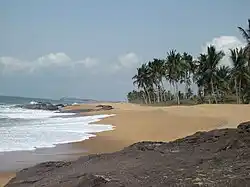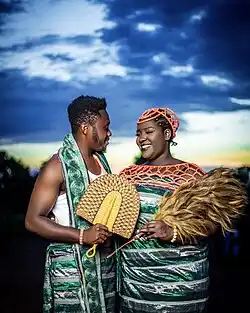Ghana is a country in West Africa with a very long and rich history, which has maintained one of the relatively freest and most stable governments on the continent, and which has had big influence in the decolonization of the continent, as it became the first colony in Sub-Saharan Africa to achieve independence in 1957, under the leadership of Kwame Nkrumah.
Research your ancestors on MyHeritage
Administrative divisions of GhanaAdministrative divisions of Ghana
Ghana is divided into 16 regions, which are Ahafo, Ashanti, Bono, Bono East, Central, Eastern, Greater Accra, North East, Northern, Oti, Savannah, Upper East, Upper West, Volta, Western, and Western North. These regions are further subdivided into 261 districts, including 145 ordinary districts, 109 municipal districts, and six metropolitan districts.
History of GhanaHistory of Ghana
The Kingdom of Dagbon in the north and the Bonoman in the south were the first kingdoms to establish themselves in Ghana; the former lasted until the eleventh century. The Ashanti (Assante) Empire,[1] which began as a loose network and eventually developed into a centralized kingdom with its capital city of Kumasi, included the southern portion of Ghana by the 19th century. The primary commodities on which the Akan people built their economy were gold and gold bars, which they exchanged with other African nations. Following contact with the Portuguese in the 15th century, who arrived in the Gold Coast region to trade gold and slaves for the American colonies, the Akans began trading with European nations. The Dutch, Swedes, Danes, Germans, and finally the British joined them later, and they fought the Akans in the Anglo-Ashanti wars that lasted for 100 years until 1900. Under the name Gold Coast Colony, Britain formally united the Ashanti states and the Northern Territories with the Gold Coast Protectorate in 1902.
The territory became an independent dominion within the British Commonwealth in 1957 under the name Ghana, following years of a "positive action" campaign that included nonviolent protests, strikes, noncooperation with British authorities, and the imprisonment of political leaders. Kwame Nkrumah, the first African head of state to advocate for Pan-Africanism, the founder of the Organization of African Unity, and one of the founders of the Non-Aligned Movement, served as prime minister and later as president during this time.
Between 1966 and Flight Lieutenant Jerry John Rawlings' rise to power in 1981, Ghana was governed by a succession of alternate military and civilian administrations that were frequently impacted by economic instability. The 1992 presidential election saw the promulgation of a new constitution that reinstated the multi-party system of governance. Since then, Ghana's government has been among the continent's most stable and free.
Geography of GhanaGeography of Ghana

Ghana is a nation in West Africa that is located near the Gulf of Guinea. Ghana's south Atlantic Ocean coast includes plains, low hills, rivers, Dodi Island, Bobowasi Island, Lake Volta, the largest artificial lake in the world, and more. There are four distinct geographical ecoregions that make up Ghana. The hydroelectric Akosombo Dam, which was finished in 1965, created Lake Volta, the third-largest reservoir in the world by volume and the largest by surface area, where the White Volta River and its tributary Black Volta flow south through Ghana.
Ghanaian ethnicityGhanaian ethnicity

With the Akan, Ewe, Mole-Dagbane, Guan, and Ga-Adangbe being the main ethnic groups, the majority of Ghanaians are of Sub-Saharan descent. Approximately 47.5% of the population identifies as Akan, making up a plurality of the nation. Around 3-4 million Ghanaians live outside of the country, with the largest communities residing in Nigeria, the United States and the United Kingdom.
Ghanaian surnamesGhanaian surnames

Ghanaian surnames are an essential tool for genealogical research, providing valuable information about potential ancestors and family lineages; Place names are used as surnames by a significant number of people in Ghana. Ghanaians often give their children a "day name" that relates to the day of the week in which they were born and has additional connotations related to the individual's soul and character. The majority of Ghanaians have at least one name from this system, even if they also have a Muslim or Western name. Middle names are much more varied and can relate to an ancestor's middle name, birth order, or twin status.
See alsoSee also
Explore more about GhanaExplore more about Ghana
- Ghana -- Vital records at MyHeritage
- Genealogy Projects tagged with Ghana on the Geni Family Tree
- Some Guidelines For Family Research in Ghana
References
- ↑ Asante empire. Encylopedia Britannica
